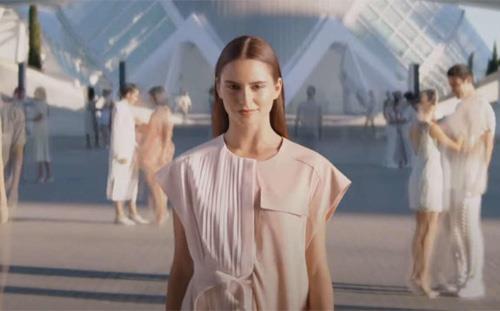
It's just as hard to create a Utopian community on TV, apparently, as it is in real life.
In both cases, the problem stems from the inconvenient and annoying fact that even Utopian communities need to include people, and people inevitably screw up all that carefully planned perfection.
Television's newest Utopian community, Brave New World, opens its doors Wednesday as a marquee feature in NBC's new streaming service, Peacock.
Brave New World, based on the 1932 Aldous Huxley novel, has appeared on screens before, and it will surprise no one that this version has been updated to reflect what, in 2020, we consider futuristic technology and attitudes.
Reflecting television's multiple other futuristic productions, this Brave New World gives us sleek cities with lots of geometric architecture and frequent scenes involving swirling kaleidoscopic passageways.
Like other Utopias of the future, this one shows us a society that has seemingly conquered every obstacle to happiness.
All people are, for instance, ideally shaped. No one seems to be overweight or underweight. Everyone seems to be gainfully employed. Frequent sexual encounters with your fellow perfect people are not only available but, seemingly, almost required.
Lest all of this still leaves any future citizens feeling even a touch melancholy, everyone is continuously supplied with little happiness pills, called soma, that are engineered to produce instant joy.
Still, where there are people involved, someone is bound to get it wrong. So sure enough, the first person we meet, Lenina Crowne (Jessica Brown Findlay, top), is on her way to get scolded by an overseer for the transgression of spending two full months in a monogamous relationship.
"No monogamy" is one of the three commandments of this Brave New World, along with "no family" and "no privacy." Money and history are also forbidden since, like monogamy, family, and privacy, they can cause unhappiness.
The "no privacy" bit works literally. Everything you do in your life – yes, folks, everything – can be summoned by an overseer and reproduced at the snap of the fingers as a hologram.
So among other things, it's not a society in which people embarrass easily. When everyone can know all your secrets, you learn to live with it – maybe because you also can know all theirs, or maybe because of the happy pills, which are called "oranges" even though this society still grows real oranges that look much more appealing.
The bossman who calls in Lenina for her reprimand, Bernard Marx (Harry Lloyd), seems properly robotic, distanced, and supremely confident about his role in this world.
But wait, it turns out Bernard also has a touch of the residual renegade.
This surfaces as he and Lenina head out to the theme park called Savage Adventure, where unenlightened people from the old unhappy world act out their old-school lives full of stress and uncertainty, which leads to crime and violence.
If you're thinking this sounds like a cousin of Hunger Games, that's not a bad thought to keep.
In Savage Land, Lenina and Bernards encounter a props tech appropriately named John the Savage (Alden Ehrenreich). John works on the Savage show, which is the main attraction of Savage Adventure, and frankly, it feels like a dead-end gig until Bernard and Lenina show up and through an odd series of events bring him back to their world.
If you thought Lenina's monogamy was a social disrupter, you ought to see what John the Savage does.
As this suggests, Brave New World has more than a few comic elements alongside its ominous warnings about the downside of Utopian societies.
Lloyd and Findlay make a fine leading pair. She, of course, was a rebel even back in 1920s England as Sybil on Downton Abbey. She has a much sleeker look here, which is also true of all the other characters since this is, after all, a Utopia of happiness.
Perhaps as a reminder that Peacock is a streaming service and therefore not subject to broadcast guidelines, Brave New World sprinkles in some four-letter words and a few modest flashes of nudity.
It feels like a stylized TV drama, and if that might surprise Aldous Huxley, remember he wrote it before there was even such a thing as television.
There were people, however, and he would nod in approval when once again, 88 years later, people remain the main obstacle to all that happiness.